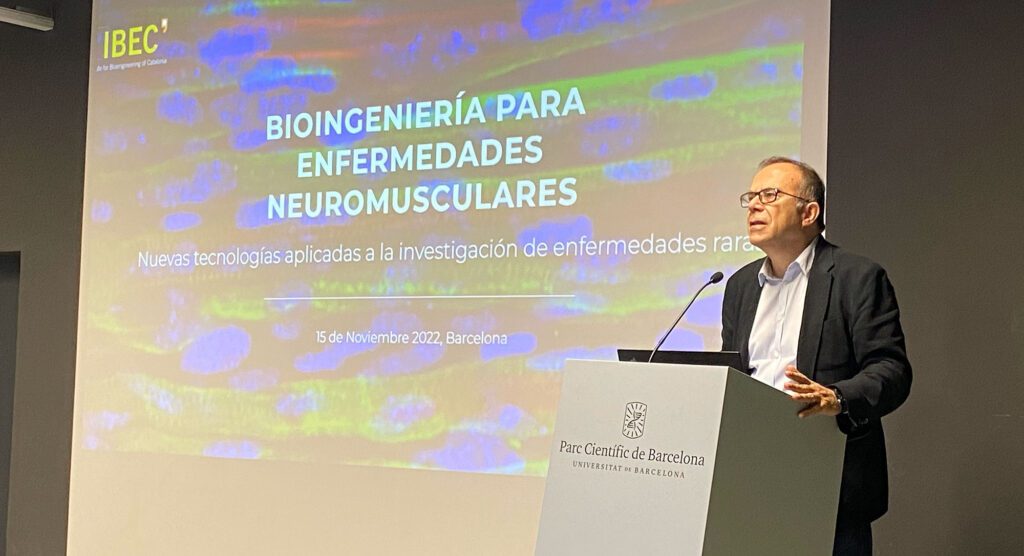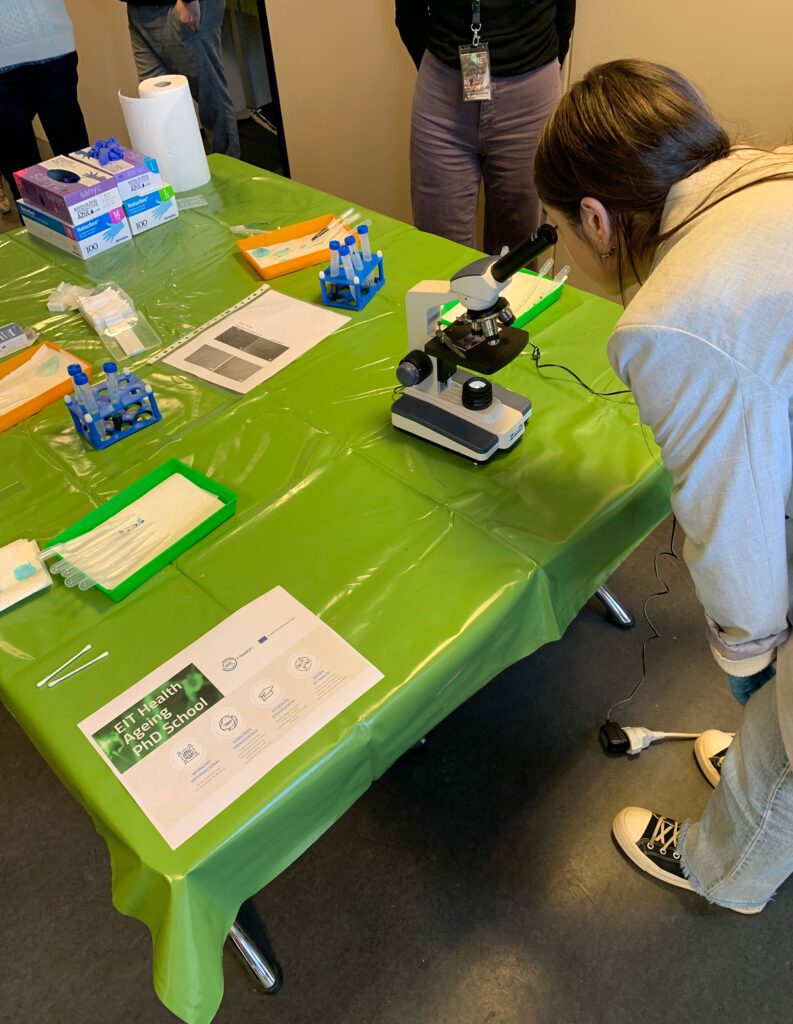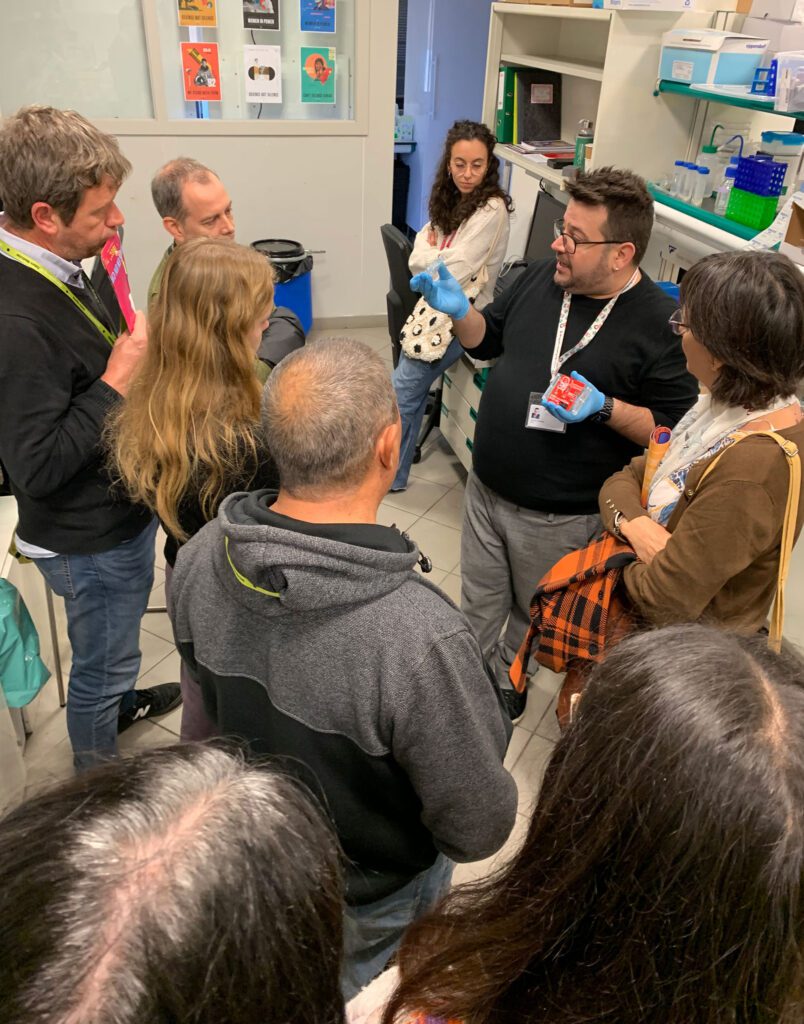On November 15th, the World Day of Neuromuscular diseases was celebrated. Coinciding with the date, IBEC organised two events that brought together scientist and patients to talk about the new approaches in which bioengineering can impact for the diagnostics and treatment of these minority diseases.
Despite being considered rare or minority diseases, more than 150 neuromuscular diseases have been described to date, and unfortunately, most of them do not have adequate diagnostic methodologies or cures. Patients only count with palliative treatments to reduce the symptoms. In most cases the origin is genetic, and many are also hereditary. Although the cause and the symptoms vary, all are characterized by an increased muscle weakness that results in loss of mobility and motor skills of patients. This large group of diseases include, among others, amyotrophic lateral sclerosis (ALS), Duchenne muscular dystrophy, and various myopathies, muscle paralysis, and inflammatory or metabolic muscle diseases.

In this context, several research lines at IBEC are seeking to contribute, through bioengineering, to the development of new tools for the diagnosis and the treatment for these diseases. On the 15th of November, IBEC celebrated the I Congress on Bioengineering for Neuromuscular Disease. Renowned IBEC researchers and guests from other scientific institutions showed the latest advances in neuromuscular disease research from different perspectives.
The Congress, driven by Juanma Fernandez, researcher at the group of “Biosensors for bioengineering”, was inaugurated with Josep Samitier’s welcome. The director of IBEC highlighted the need of designing new systems to improve both the diagnosis and the therapies in this field: “From IBEC we use the bioengineering to contribute with tools for the development of biomodels for the study, and new therapies that would allow us to confront better the neuromuscular diseases”.
Several invited researchers highlighted the need to know in deep the specific neuromuscular physiopathies to establish clear and faithful methodologies for a correct diagnosis. Moreover, researchers underlined the challenge of being able to develop new drugs and genetic therapies directed towards new therapeutic targets for an effective treatment.
One innovative approach was presented by Marta Badia, researcher from the group Transiciones de fase proteica en salud y enfermedad” at IBEC. By employing the technique of deep sequencing, she showed promising results that allow to establish genetic expression patterns that can be used to detect, earlier and with more precision, the influence of mutations on the development of neuromuscular diseases.
On the other side, Josep Samitier and Juanma Fernández highlighted the need to engineer alternative study models, not based on the use of animal experimentation, to reproduce those diseases in the laboratory and permit the evaluation of the impact of new drugs. In this sense they focused on the technique known as “organ-on-chip”, that allow to reproduce human tissues from some few cultivated cells. This technique is not only very useful to study the nature of physiopathies, but also to test drugs in a rapid and efficient way. Moreover, it’s a personalized methodology as it can use cells from the patients themselves.
“In our laboratory we use new technologies to develop organ-on-chip model systems that allow us to emulate in vitro a physiologic or physiopathologic process, as for example in the context of neuromuscular diseases”. Juanma Fernández
The event was concluded by Marisol Montolio del Olmo, director of the research and technology department of Duchenne Parent Project Spain, who highlighted the importance of an early detection of neuromuscular diseases, among them the Duchenne muscular dystrophy, and the need to develop models to study the impact of different mutations on the disease.
The event was co-organized and sponsored by the UB Cathedra of Rare Diseases
Outreach event about neuromuscular diseases
Related with the Conference, IBEC also organized an outreach event oriented to patients, families, patient’s associations and everyone interested in the research related to neuromuscular diseases. This was a more informal event, held on Saturday 19th morning, that showed to the assistants how science, and more concretely bioengineering, is facing the research in this field.


Different talks and activities were organized during the event, that culminated with a guided visit to some laboratories where assistants could see first-hand where and how IBEC researchers work.





